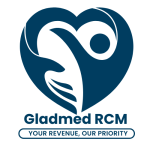–
Why Denials Matter for Your Practice
At GladMedRCM, we know every denied claim is lost revenue and wasted effort. With claim-denial costs averaging $50 to rework and many never reprocessed denials can sink your cash flow if left unchecked. Leading practices track denial KPIs rigorously to drive improvement and protect profits. This checklist captures the 15 metrics we use in our own GladMedRCM analytics platform to help clients recover revenue and streamline their RCM operations.
Key benefits of tracking these metrics with GladMedRCM:
- Recover revenue faster with targeted fixes
- Prioritize process improvements where they matter most
- Measure ROI on every denial-reduction initiative
- Report clear results to your leadership team
Use this framework to align your finance, billing, and operations teams—and turn denials into dollars.
1. Initial Denial Rate (%)
- What we track: (Denied claims ÷ Submitted claims) × 100
- Why it matters: Top clinics achieve <5%; industry average is 10–12%. Our clients often see a 30% reduction in this rate within six months.
- GladMedRCM tip: Set rolling 30-day benchmarks in our dashboard and get automated alerts on spikes.
2. Top 5 Denial Reasons
- What we track: Root causes—eligibility, missing authorizations, coding, medical necessity, timely filing.
- Why it matters: A handful of reasons drive ~70% of denials.
- GladMedRCM tip: We map denial reasons to workflows, so your team fixes the biggest issues first.
3. Denial Rate by Payer
- What we track: Denials segmented by each insurer you bill (Medicare, Medicaid, BCBS, United, etc.).
- Why it matters: Reveals which contracts need renegotiation or targeted workflows.
- GladMedRCM tip: Our platform highlights payer outliers so you can reallocate appeals capacity and open data-driven conversations with payers.
4. Denial Rate by Service Line
- What we track: Denials by department or specialty (behavioral health, ABA, outpatient therapy).
- Why it matters: Identifies hotspots for staff training or process tweaks.
- GladMedRCM tip: Use our visual dashboards to share service-line performance with clinical leaders.
5. Total Denied Amount & % of Charges
- What we track: $ denied vs. total billed charges.
- Why it matters: Quantifies your revenue at risk.
- GladMedRCM tip: Convert denied charges into net revenue lost—our calculator tool does this instantly.
6. Denials by Financial Class
- What we track: Denials broken out by payer type and self-pay.
- Why it matters: Reveals coverage lapses and billing-class issues.
- GladMedRCM tip: Optimize patient eligibility workflows with our pre-submission checks.
7. Timely-Filing Denials
- What we track: Count and $ value of late-submission denials.
- Why it matters: 100% preventable; each delayed claim is lost revenue.
- GladMedRCM tip: Implement our 10-day claim-filing SLA and watch timely-filing denials drop to zero.
8. Appeal Success Rate (%)
- What we track: % of appealed denials overturned in your favor.
- Why it matters: Indicates appeal-team effectiveness and payer error rate.
- GladMedRCM tip: Our standardized appeal templates have delivered 55–65% success rates for clients.
9. Average Days to Resolve Denials
- What we track: Time from denial receipt to final resolution.
- Why it matters: Shorter resolution cycles boost cash flow.
- GladMedRCM tip: We aim for <20 days resolution, using automated workflows and real-time alerts.
10. Front-end vs. Back-end Denials
- What we track: Denials by origin—registration/eligibility vs. coding/documentation.
- Why it matters: Directs accountability between patient-access and billing teams.
- GladMedRCM tip: Our root-cause analyzer assigns each denial to the right team automatically.
11. Denial Rework Cost
- What we track: Staff hours × internal cost per denial.
- Why it matters: High rework costs justify automation or outsourcing.
- GladMedRCM tip: Clients cut denial rework labor by 40% with our blended team model.
12. Denial Write-off Rate (%)
- What we track: % of denied dollars never recovered.
- Why it matters: The true revenue leakage metric.
- GladMedRCM tip: We benchmark write-off rates and set targets to drive continuous improvement.
13. Denials Avoided (Proactive)
- What we track: Denials prevented by claim edits and auth checks before submission.
- Why it matters: Validates your proactive RCM investments.
- GladMedRCM tip: Our Eligibility+ module prevents ~15% of potential denials before they hit payers.
14. Denial Backlog (Aged)
- What we track: Open denials by age bucket (0–30, 30–60, 60–90, 90+ days).
- Why it matters: Reveals resource gaps—older denials risk never being collected.
- GladMedRCM tip: We maintain a real-time backlog view to keep denial queues consistently under 7 days.
15. Net Improvement from Initiatives
- What we track: KPI shifts tied to specific projects (e.g., coding tool, auth workflow).
- Why it matters: Demonstrates ROI on each denial reduction initiative.
- GladMedRCM tip: We deliver quarterly ROI reports showing revenue impact of every process upgrade.
Implementing with GladMedRCM
- Live Dashboards: Access our all-in-one RCM portal with traffic-light indicators and custom alerts.
- Collaborative Reviews: Monthly deep dives with your leadership team and our experts.
- Continuous Optimization: We treat your denial metrics as an ongoing KPI—tweaking workflows and tools each quarter.
Maximize collections, minimize rework, and protect your bottom line with GladMedRCM’s proven denial-management framework.
